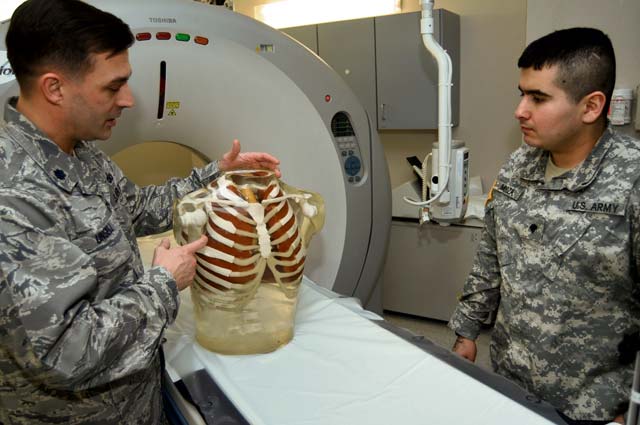
Lt. Col. Bryan Unsell explains a calibration procedure for the CT scanner to Spc. Yobani Mendoza, a CT technologist.
Last year, when Lt. Col. Bryan Unsell was interpreting thousands of computed tomography scans, MRI scans, ultrasounds, mammography and plain film images, one finding in his efforts became clear — he’s among the best at what he does.
That’s the conclusion reached by the Air Force, which named the LRMC deputy chief of radiology the service’s 2012 John R. Witherow Radiologist of the Year.
“While it does feel good to be recognized in this way, I also know that as I look at my colleagues and those that I worked with downrange, many are just as deserving,” said the 20-year Air Force veteran who voluntarily served a March to June deployment to Bagram Air Base, Afghanistan.
Unsell’s award recognizes many of his accomplishments during his time downrange, where he was the radiology flight commander at the largest in-theater hospital and responsible for approximately a dozen staff members and millions of dollars in equipment.
While there, his team provided imaging support for more than 500 trauma patients, and Unsell interpreted more than 130 trauma CT scans.
“I remember a U.S. Soldier whose job was to drive trucks,” Unsell said. “He had been in an IED (improvised explosive device) blast and we were performing a trauma CT on him. Fortunately, he was not significantly injured. I noticed that he had also had another recent trauma CT. He told me he had been in vehicles that had been hit by IEDs on five different occasions and that is why he had previously had a trauma CT scan. As soon as he was cleared, he would go back out and do the job again. I was really amazed by his bravery.”
Although Unsell’s achievements during his deployment were lauded in his selection for the award, including strengthening coalition relations in partnering with Egyptian and Korean physicians during NATO counterinsurgency operations, it was the service members he was there to serve who really made an impact on him.
“There were several times that I saw severely injured Soldiers, to include those with amputated limbs, that were far more concerned about how their injured buddies were doing than the fact that they, too, were injured,” he recalled. “This always impressed me greatly.”
One time- and money-saving initiative Unsell put into practice at Bagram was the first-ever use of arthrograms.
“Arthrograms require an injection of special contrast directly into a joint, followed by an MRI,” he said. “This increases our sensitivity for detecting tears inside the joint. In the past, patients requiring an arthrogram had to be medevaced to LRMC. We had an MRI scanner, but were not performing arthrograms. Since we do so many of these at LRMC, I was very comfortable with the procedure, so I performed it in-theater. This allowed the orthopedic surgeons to decide if further treatment was needed without having to medevac the patients before having all the information.”
Back at his regular duty station, he was no less instrumental in helping oversee the military’s largest overseas radiology department.
“His selfless service and expertise while deployed to Bagram AB and dedication to duty while in garrison have greatly contributed to meeting the mission of compassionate and world-class health care to our wounded warriors and beneficiaries,” said Col. Robert Fischer, LRMC deputy commander for clinical services.
Unsell sought out and completed an American College of Radiology cardiac MRI certification last year, saving LRMC more than $40,000 a year in referrals.
“I love the opportunity to work in the entire breadth of the radiology specialty,” said Unsell, who arrived at LRMC in 2009 after “actively campaigning” for an assignment here because of LRMC’s mission as a first stop in treating wounded warriors from downrange.
His recognition is even more impressive because radiology is his second career in the Air Force. Unsell spent his first eight years of active duty as an agent with the Office of Special Investigations doing criminal, fraud and counterintelligence investigations.
“When I decided to change careers, I wanted to continue my career in the military and the Uniformed Services University of Health Sciences was a great option,” said Unsell, who also holds a bachelor’s degree in computer science from Oregon State University and a master’s degree in criminal justice from George Washington University.
“I liked the technical and diagnostic aspects of the specialty,” he said about choosing the radiology field. “I feel it is extremely challenging.”
It’s fair to say that with the highest level Air Force recognition in his field, he’s met the challenge.







